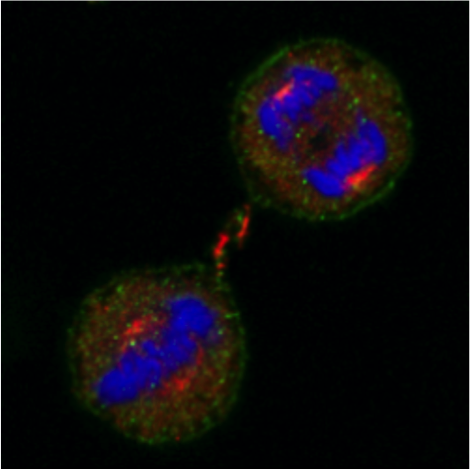By Helen Figueira
October 20, 2016
Time to read: 4 minutes
By Deborah Oakley
Scientists have shown that the many different types of cells in our bodies all take the same amount of time to divide into two new daughter cells, in the process known as mitosis. This timing is crucial. When the team manipulated the cells to make mitosis longer or shorter, the cells died.
“The results are surprising and not intuitive at all,” says Silvia Santos of the MRC Clinical Sciences Centre (CSC) and who led the research. Santos says it’s well known that different types of cell take different amounts of time to complete the full cell cycle, which moves from rest to growth to division into new cells. For example, in embryonic cells the cycle happens quickly, within a few hours, whilst in cells not involved with reproduction it takes much longer, more than 24 hours in some cells. It had been thought that mitosis, as one part of this cycle, would scale up or down in relation to the length of the whole cycle.
The new findings, published today in Molecular Cell, show that all of our bodies’ cells spend around 50 minutes in mitosis. The study also identifies the molecular mechanism that cells use to control the timing of their division like clockwork. Santos says, “It seems that somehow our cells have developed ways to control biological processes in time. And when you disrupt that, you fatally disrupt the whole cell.”

Mitosis is one of the most fundamental processes in cell biology, according to Santos. “It is the one time in the cell cycle that a cell needs to irreversibly commit. We think that once it commits, it really wants to run through mitosis quickly. If something doesn’t go right, and if this makes it stay in mitosis a little bit longer, even a few minutes, then this is a signal that it needs to abort operations.”
Ana Rita Araujo, a PhD student at the CSC who worked with Santos on the study, explored the duration of mitosis in embryonic stem cells, and various types of non-reproductive cells, including breast cells (pictured) and cancer cells. Araujo and Santos say the results help them to better understand how cell division is regulated in healthy cells, and how it becomes de-regulated in disease.
“Our cells have developed ways to control biological processes in time”
Silvia Santos
To measure how long the cells spent in mitosis, the team developed a technique to colour-code the different phases of the cell cycle. They inserted into cells proteins that each emitted different coloured light when activated during different phases of the cycle. Cell growth typically appeared yellow, DNA replication was red and cell division during mitosis was blue. Araujo watched the colours of individual cells change in real time under the microscope and this allowed her to measure how long each cell spent in mitosis.
Combining cell imaging with computer modelling allowed the researchers to show that cells control the length of mitosis through a network of proteins in a positive feedback loop. “It was really the combination of the interdisciplinary aspects that allowed us to understand what was going on,” says Santos.
“It’s very fashionable these days to study variability. People are very obsessed with why is it that in a population of cells, things are variable, and what are the benefits to having this variability. Our work shows exactly the opposite. It shows that some fundamental cellular processes, like cell division, require an exquisite regulation of time.”
Santos says the research is in line with previous work by scientists at Stanford University, which showed that the constant timing of mitosis is key to the survival of human embryos. If this timing is disrupted, embryos cannot survive.
To find out more get in touch:
Deborah Oakley
Science Communications Officer
MRC Clinical Sciences Centre
T: 0208 383 3791
M: 07711 016942
E: